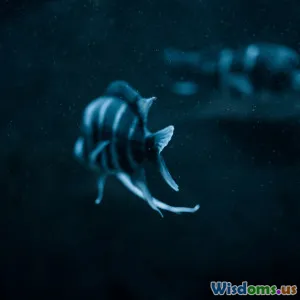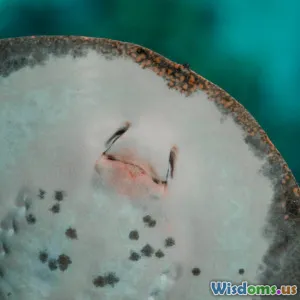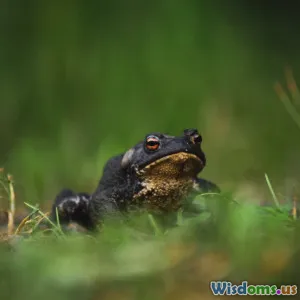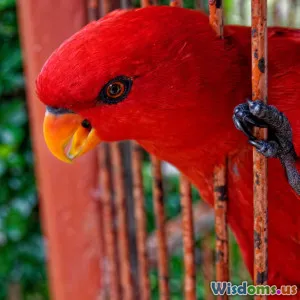
The Surprising Intelligence Behind Octopus Problem Solving Skills
8 min read Discover the remarkable intelligence and unique problem-solving skills of octopuses, revealing astonishing insights into this marine wonder. (0 Reviews)
The Surprising Intelligence Behind Octopus Problem Solving Skills
The depths of the ocean are home to many marvels, but few creatures capture the human imagination like the octopus. What makes this elusive marine animal so fascinating isn’t just its eight limbs or its uncanny ability to camouflage — it's the astonishing intelligence it demonstrates through sophisticated problem-solving. Octopuses have repeatedly challenged long-held views about cognition in invertebrates. In this article, we dive deep into their surprising problem-solving skills, uncovering what they reveal about intelligence beyond the vertebrate world.
The Intelligence of the Octopus: An Overview
Unlike most marine animals, octopuses showcase signs of complex brain function despite being invertebrates. With approximately 500 million neurons — comparable to a dog’s brain — distributed not only in their central brain but also across their arms, octopuses process information in a decentralized yet interconnected manner.
Brain Structure and Its Role
Unlike vertebrates with a centralized brain, octopus neurons are found in the brain and the arms, giving each arm semi-autonomy. This neural distribution enables remarkable dexterity and independent control while solving problems. Neuroscientists describe it as a form of distributed intelligence — a network more akin to a highly coordinated team than a single command center.
Real-World Examples of Octopus Problem Solving
Unlocking Jars and Manipulating Objects
Some of the most well-documented examples come from controlled experiments where octopuses have been presented with sealed jars containing food. They learn to unscrew the lids, demonstrating not only strength but fine motor skills and understanding of cause and effect.
For instance, a study published in Zoology showed that common octopuses (Octopus vulgaris) learned to open jars in a sequence of movements, refining their technique through trial and error. This behavior points to memory, learning capacity, and adaptability.
Using Tools in the Wild
Perhaps one of the most groundbreaking observations happened in the wild near Shark Bay, Australia. Researchers documented octopuses collecting and assembling coconut shells for shelter — gathering them in pieces and later reassembling these shells to hide safely.
This represents tool use, a behavior once thought to be predominantly human or at least limited to certain mammals and birds. The ability to plan for future use by transporting and arranging tools indicates a level of foresight and cognitive flexibility rarely credited to invertebrates.
Escape Artists and Problem Solvers
Aquariums often witness octopuses escaping their tanks through tiny openings. Their escapes require careful planning, dexterity, and environmental awareness. One famous example is a two-spotted octopus that squeezed through a minuscule gap to access another tank to prey on fish, showing strategic thinking.
Cognitive Mechanisms Behind Problem Solving
Learning and Memory
Octopuses demonstrate both short and long-term memory in experiments. By repeating trials with puzzle boxes or mazes, they show improvement, indicating learning from experience. They can distinguish between visual patterns and remember locations of prey or shelter.
Sensory Integration
Despite poor eyesight compared to some fish, octopuses excel in integrating tactile and chemical cues through their sensitive suckers. Their arms gather information about texture, shape, and even taste, which aids in manipulation and decision-making.
Innovation and Flexibility
Their problem-solving isn’t rigid. Octopuses adapt their strategies dynamically based on the situation. For example, if an escape route is blocked, they explore alternative options rather than repeating the same failed attempts.
Implications for Understanding Intelligence
Traditionally, intelligence has been studied within vertebrates, focusing on mammals and birds. The octopus forces scientists to reconsider these perspectives, illuminating a form of complex cognition that evolved independently through convergent evolution.
Comparative Cognition
Studying octopuses enriches our understanding of intelligence by showing how elaborate behavior can arise in radically different nervous systems. This broadens definitions of problem-solving, showing it is not confined to brains structured like those of primates.
Ethical Considerations
Recognizing the cognitive sophistication of octopuses influences how they should be treated in research and captivity. Many regions have revised animal welfare laws to protect cephalopods, acknowledging their capacity for sentience.
What Can We Learn from Octopus Intelligence?
Humans can draw inspiration from the octopus’s problem-solving skills for numerous fields:
- Robotics & AI: The decentralized nervous system inspires designs of flexible robots with distributed sensors.
- Neuroscience: Studying octopus brains may unlock new models of neural plasticity and learning.
- Conservation: Understanding their intelligence may promote conservation efforts for marine habitats.
Conclusion
The octopus serves as a captivating example of intelligence flourishing under radically different biological constraints. Their problem-solving skills — from tool use to sophisticated escape attempts — challenge us to think more broadly about cognition. As science uncovers more about these mysterious cephalopods, our appreciation grows not only for the octopus itself but for the diverse forms intelligence can take across the animal kingdom.
Continued research is bound to reveal even more astonishing facets of octopus intelligence, urging humanity to respect and protect these masters of the sea. Their remarkable brainpower forces us to reconsider what it means to be smart in the natural world.
References
- Mather, J. A., & Anderson, R. C. (1999). Exploration, play and habituation in octopuses (Octopus dofleini). Journal of Comparative Psychology, 113(3), 333–338.
- Finn, J., Tregenza, T., & Tregenza, N. (2009). Defensive tool use in a coconut-carrying octopus. Current Biology, 19(23), R1069–R1070.
- Seibel, B. A., & Carlini, D. B. (2007). Cephalopod brains and cognitive evolution: deep roots and distant cousins. Marine Hormones and Neurotransmitters, 41–45.
- Byrne, R. A., Kuba, M. J., & Meisel, D. V. (2009). The cognitive abilities of octopuses. Advances in the Study of Behavior, 41, 1–42.
Images and additional resources are encouraged for enriched learning but are not included here.
Rate the Post
User Reviews
Popular Posts

















